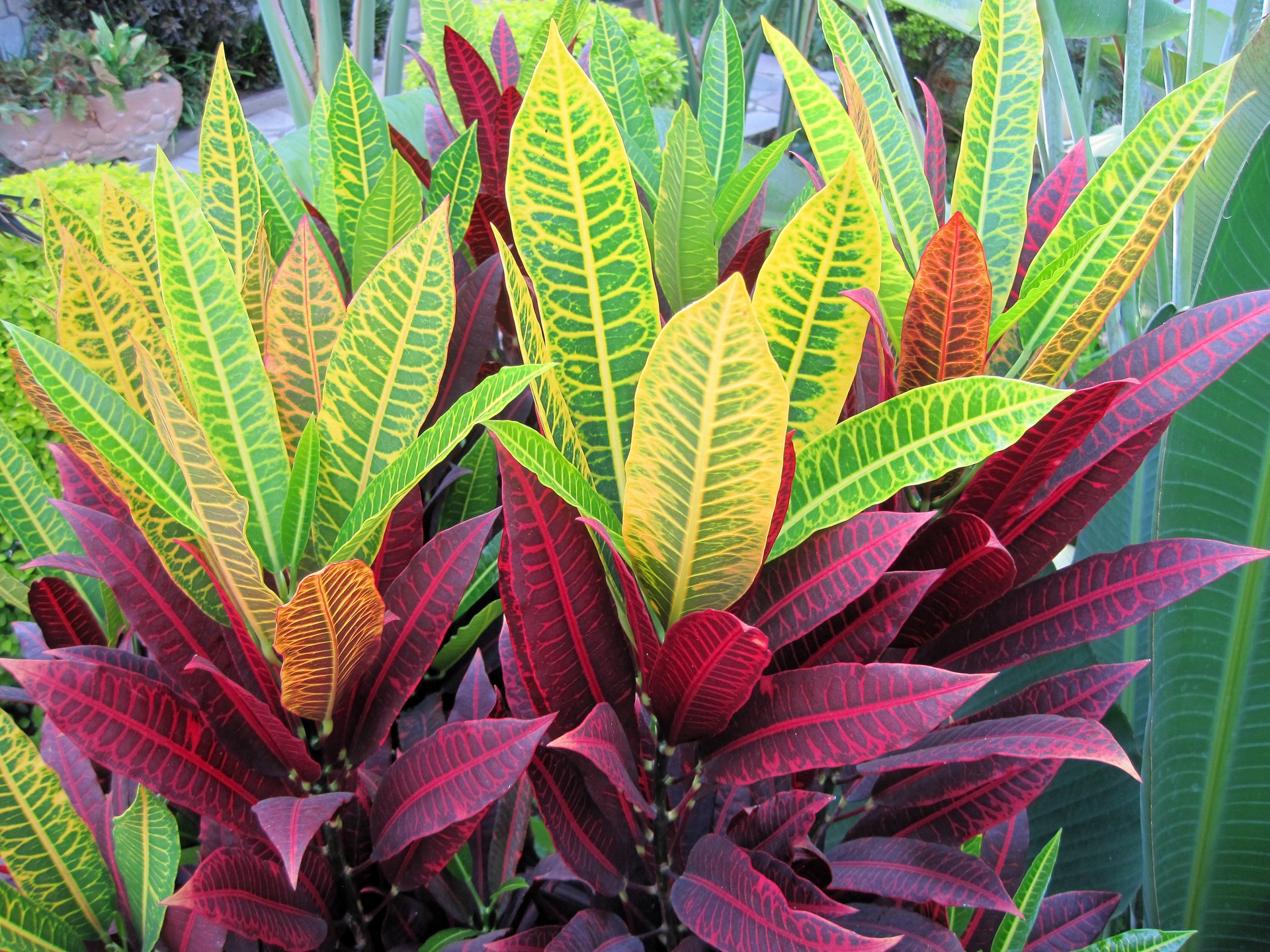Pets love houseplants, even if this love is not always mutual. Combining your favorite animals with house plants poisonous to dogs and cats in one apartment becomes a real challenge. Cats and dogs are prone to chew flowers and grass because of a lack of certain substances in the body or simple curiosity.
Sometimes, animals instinctively sense danger. But over the years of domestic living, they have lost the ability to recognize poisonous things. Unlike nontoxic houseplants for dogs and cats, eating or licking toxic plants can cause severe poisoning, allergies, and even death in cats, dogs, parrots, hamsters, etc.
The croton (Codiaeum variegatum) is a popular houseplant known for its colorful, variegated leaves. But this beautiful plant poses a severe poisoning risk to curious cats who may nibble on the leaves or stems. All parts of the croton plant contain toxins called diterpenoid phorbol esters that can irritate the mouth, stomach, and intestines if ingested by cats
According to the ASPCA, common signs of croton poisoning in cats include excessive drooling, vomiting, diarrhea, loss of appetite, and skin irritation if exposed to the plant’s sap. The toxins affect cats more severely than dogs, so even a small amount can cause concerning symptoms Kittens, small cats, and cats with underlying health issues are most at risk for life-threatening reactions
If you catch your cat chewing on or playing with any part of a croton plant, take action immediately. Wipe out its mouth to remove any sap or plant material. Check for skin irritation from the sap and wash with soap and water. Identify what parts were ingested and watch closely for concerning symptoms over the next 12 hours. Contact your veterinarian or the ASPCA Poison Control Center for advice.
Bring your cat and a sample of the plant in for examination if symptoms like repeated vomiting, diarrhea, or lethargy develop. With prompt veterinary treatment to control nausea, rehydrate, and support kidney function, most cats recover fully in 24-48 hours. However, prevention is key, so keep all croton plants completely out of your cat’s reach.
While rare, death can occur if dehydration from profuse vomiting and diarrhea sets in before treatment begins. So don’t wait if your cat eats a croton plant – seek prompt veterinary care. With vigilance, you can help keep your curious cat safe while still enjoying the beauty of a croton as a houseplant. Just place it somewhere totally inaccessible to avoid catastrophe.
Key Takeaways
-
All parts of croton plants, including the leaves, stems, sap, and seeds, are toxic to cats.
-
Common symptoms include vomiting, diarrhea, drooling, and loss of appetite.
-
Seek prompt vet care if your cat eats any part of a croton plant to prevent dangerous dehydration.
-
With treatment, most cats recover fully within 24-48 hours.
-
Thoroughly cat-proof your home by keeping croton plants completely out of reach. Prevention is critical.

First Aid for Poisoning
The most important thing is to remove the toxic particles of the plant from the skin, mucous membranes, or the animals body as soon as possible. If the sap of plants poisonous to dogs gets on the skin or eyes, rinse them with plenty of water. If there is a suspicion that the animal has swallowed a piece of the plant, it is necessary to give a large amount of water, try to induce vomiting, and give sorbents.
The next step is to visit the vet. In such a situation, you cannot hesitate! You are risking your pets life, and every minute matters. Bring a photo of the eaten plant with you so the vet can determine the type of toxin and prescribe adequate therapy. Usually, animals dont eat a lot of poisonous leaves, so the intoxication is rarely severe. Nonetheless, everything depends on your pet and its health condition.
Is Foliage Toxic to Cats?
Foliage plants are a wide variety of species. Unfortunately, most foliage or ornamental plants are either toxic or unedible for cats and other pets. So, everything depends on a particular species of foliage plant.
Are Croton Plants Toxic to Cats? What You Need to Know #crotonplant #houseplants #petsafety #petcare
FAQ
What happens if a cat eats croton?
Toxicity to pets
Croton is a common name often used for Codiaeum variegatum, an ornamental plant. Ingestion may cause mild oral and gastrointestinal irritation resulting in mild drooling, vomiting, and/or diarrhea. Skin irritation may also occur after exposure to the sap but tends to be mild.
Are croton houseplants safe for cats?
Other common plants that are toxic to cats include: Croton (Joseph’s Coat) Caladium (Elephant Ear)
How poisonous is the croton plant?
As with many members of the family, croton sap can be irritating to the skin, and the plant is considered poisonous.
What is the most toxic plant to a cat?
Lily of the valley is one of the most poisonous plants to cats and dogs. The plant’s bulb, roots, stems, leaves, blooms and berries are all poisonous.
